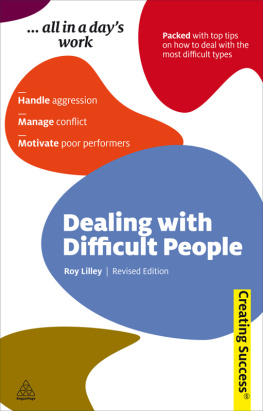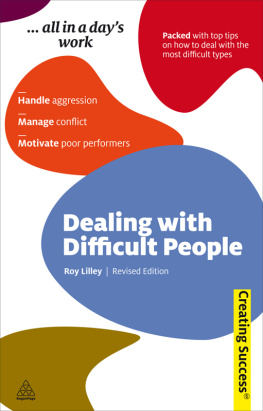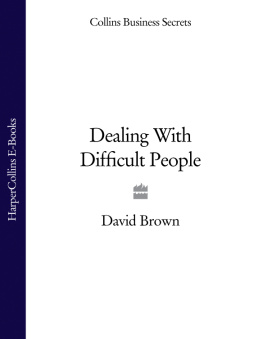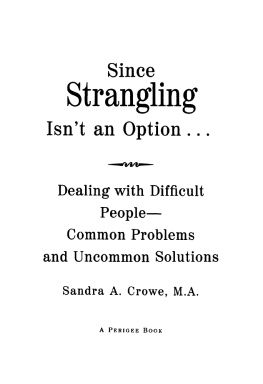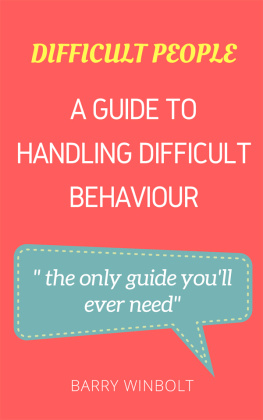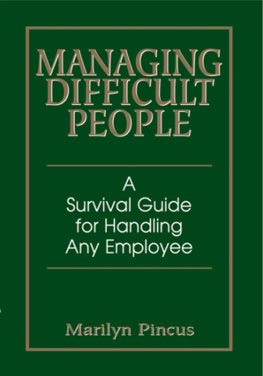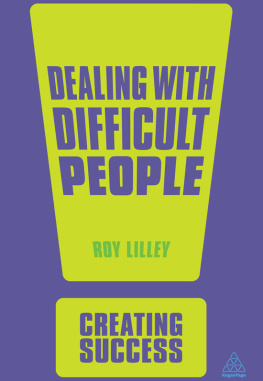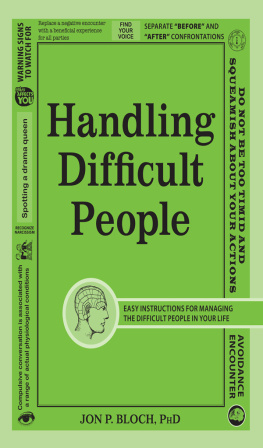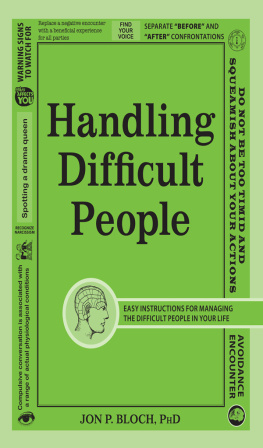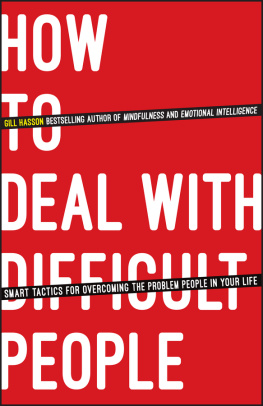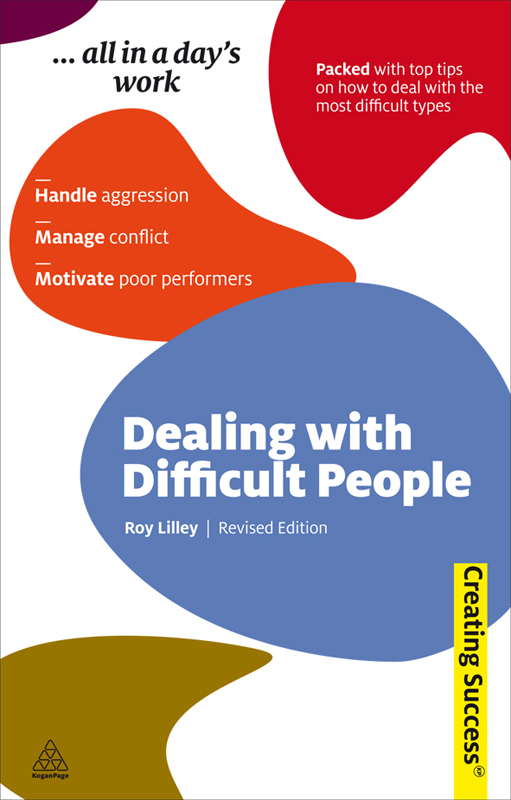Dealing with
Difficult People
Roy Lilley | Revised Edition
For ATR, who deals with the most difficult person I know.
Publishers note
Every possible effort has been made to ensure that the information contained in this book is accurate at the time of going to press, and the publishers and authors cannot accept responsibility for any errors or omissions, however caused. No responsibility for loss or damage occasioned to any person acting, or refraining from action, as a result of the material in this publication can be accepted by the editor, the publisher or any of the authors.
First published 2002
Reissued in 2006
Revised first edition, 2010
Apart from any fair dealing for the purposes of research or private study, or criticism or review, as permitted under the Copyright, Designs and Patents Act 1988, this publication may only be reproduced, stored or transmitted, in any form or by any means, with the prior permission in writing of the publishers, or in the case of reprographic reproduction in accordance with the terms and licences issued by the CLA. Enquiries concerning reproduction outside these terms should be sent to the publishers at the undermentioned addresses:
120 Pentonville Road | 525 South 4th Street, #241 | 4737/23 Ansari Road |
London N1 9JN | Philadelphia PA 19147 | Daryaganj |
United Kingdom | USA | New Delhi 110002 |
www.koganpage.com | India |
Roy Lilley 2002, 2006, 2010
The right of Roy Lilley to be identified as the author of this work has been asserted by him in accordance with the Copyright, Designs and Patents Act 1988.
ISBN 978 0 7494 5660 3
E-ISBN 978 0 7494 5891 1
British Library Cataloguing-in-Publication Data
A CIP record for this book is available from the British Library.
Library of Congress Cataloging-in-Publication Data
Lilley, Roy C.
Dealing with difficult people / Roy Lilley. -- Rev. 1st ed.
p. cm.
Includes bibliographical references.
ISBN 978-0-7494-5660-3
1. Psychology, Industrial. 2 Interpersonal conflict. 3 Problem employees. I. Title.
HF5548.8.L493 2010
650.13--dc22
2009036744
Typeset by Saxon Graphics Ltd, Derby
Printed and bound in India by Replika Press Pvt Ltd
eBook by Graphicraft Limited, Hong Kong
Contents
This is not a book to be read from cover to cover. It is not War and Peace, although with a bit of luck it will give you some ideas on how to have more peace than war.
It is a book to dip into, look for the character or situation youre having problems with, find a solution, apply it and move on. Life is too short to spend it having a row with people.
This is a book to scribble on the pages, rip bits out and do all the things with that your old school would give you detention for! This is a source book but not a reference book. A book to dive into but not to get immersed in.
This is a book you can use to improve your own performance or use as a source of ideas to work in groups to improve the performance of your team.
If all else fails it is a book just heavy enough to throw at someone who is being really difficult, without the risk of doing them any serious damage!
To the uninitiated, difficult people can be the bane of your life, a blot on your landscape and a real pain to work with. This book is designed to help you to enjoy difficult people. Once you have the key, you can unlock them, influence them, get them working for you and theyll never notice.
What else will you find?

Think about it! The light bulb will prompt you to think about an idea, spare a thought for a new approach or to take on board something different

The hazard warnings point out traps and problems for the unwary. They say, Beware, get this right, or youre in trouble!

These are good ideas, short cuts and ways to cut through the dross and the jungle.

The coffee cup says, its time to read something thoroughly, so make yourself comfortable. Or it says enough is enough, take a break!

This book is all about dealing with difficult people. Get it? Not difficult situations or difficult issues. Its the people we are focusing on. Certainly difficult people will give you a bad time, horrible situations and awkward issues to overcome. However, at the centre of it all are the people. By understanding people, how they tick, what they think and why they act like they do, we can avoid the bad times and horrible situations, and overcome the awkward issues.
| The six most important words: | I admit I made a mistake. |
| The five most important words: | You did a good job. |
| The four most important words: | What is your opinion? |
| The three most important words: | Would you mind? |
| The two most important words: | Thank you. |
| The one most important word: | We. |
| The least important word: | I. |
If we plant some seeds and the flowers dont bloom its no good blaming the flower. It may be the soil, the fertiliser, not enough water? Who knows? We just find out what the problem is and fix it.
If we have difficulties with our families, the people we work with or our friends, whats the point of blaming them? Figure out the reason and then fix it.
Yes, you! Before you can think about dealing with difficult people, lets start with you. Are you difficult? Are you the one out of step? Are you the one with the problem?
Heres some bad news for you: nice people are not always like you! Yes, yes, I know the world would be a much simpler place if everyone was like you, but theyre not. They will have different backgrounds, different education, different perspectives and different ambitions. They will be motivated differently and think differently. And they can still be nice people!

Really difficult people are most likely to be selfish and inwardly focused. They wont give a toss about you. For them, its all about them. So, dont let them get under your skin.
So the number one rule in dealing with difficult people is:
Dont take it personally!
OK, so what do you do? Easy. Ask yourself this question:
What do I want to get out of this encounter?
Decide, in advance:
- what is the purpose of the encounter;
- what are the key results you want to achieve;
- whether you need to change your behaviour to get the most out of the encounter.

